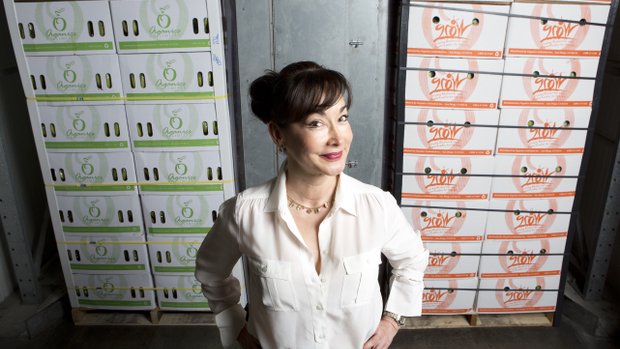Booming Banana Business
Mayra Velazquez de Leon stepped into her parents’ banana plantation business when she was just a sixth-grader. She could speak English — and her folks couldn’t — and they needed her help when they began exporting bananas to San Diego from the states of Colima and Jalisco in Mexico in the 1970s.
Velasquez de Leon eventually began working full time for her father, who had found a niche in organic bananas.
When her father retired from the business in 2000, he urged Velasquez de Leon and her husband, Manuel, to start their own venture in San Diego, and so she founded Organics Unlimited.
Her husband oversees the supply side while she takes care of sales.
Velasquez de Leon started out selling a few crates of bananas, but the business grew rapidly, doubling sales in the first couple of years. “People relied on us because we were very well known in the organic banana industry,” she said.
Today, with revenues of more than $10 million, Organics Unlimited is a big fish in a pond that is still fairly small, since there aren’t very many other entrepreneurs in the niche.
She distributes red bananas, Cavendish bananas, plantains and coconuts year round under the Organics Unlimited label as well as under the GROW brand. It stands for “grow resources and opportunities for workers,” which adds a surcharge of 60 cents per box of fruit for funding to support a program that improves the lifestyle of workers in the growing regions. Her company sells to wholesale distributors, and its customer base has expanded now to include large retail stores going into organic produce — Ralphs, Food for Less, Whole Foods. She’s also begun selling to Chiquita, but they use their own label.
Velasquez de Leon spoke with U-T San Diego about her operations and the challenges that come with the territory.
Q: How big is your distribution center here, and how much business does it handle on average?
A: Our warehouse is 25,000 square feet. It’s not huge, but we handle large volumes, about 45 truckloads a month. One load is 960 cases of bananas, and each case is 40 pounds.
We move produce quickly because it’s already been sold when it arrives. Produce we receive here is only four days from harvest, so it’s fresh. We have a logistics and traffic program that helps. We receive product in Tijuana, put it in an American truck, cross the border, get it to our warehouse and our customer picks it up. Turnaround is within 48 hours.
Q: Do you truck the produce to your customers?
A: We don’t do freight at all. We’re in the bananas business, not in anything else. The customer has their own trucks or arranges for freight. When it comes to wholesale, most distributors have their own trucks. That helps me concentrate on what we do best — selling and growing bananas. We manage with a small staff, seven employees here and three in Tijuana.
Q: Do you own your own farms or contract with suppliers?
A: We contract with growers in Ecuador and Mexico. We do everything for them from certification to shipping. But there are always some issues — people trying to take advantage of the price and market, so five years ago, we thought if we became growers, we’d have control over part of the supply. We also wanted to make sure people could buy organic bananas at reasonable prices. It’s worked very well. It also makes us fourth-generation banana growers.
Q: Why is it that your niche in organic bananas is so unpopulated?
A: It’s very hard to deal with bananas, believe it or not. They’re very sensitive to temperature. There are a lot of factors involved in ripening and distributing bananas. Today, you can compare a regular banana to an organic banana, and it looks almost the same. Before, conventional bananas used to look beautiful, while the organic ones looked ugly, but not anymore, so we’ve become very good in terms of quality, otherwise we wouldn’t be selling to Chiquita. So it’s based on quality, price and service.
Q: What are some challenges in the market today?
A: Competing with the big ones — Dole, Del Monte, Chiquita. That’s a big challenge. We don’t have distribution centers all over the U.S., but we do service other places, shipping from Colima to Texas, San Diego to Vancouver and directly from Mexico into Japan. The biggest challenge is the weather, which plays a big role.
Q: Who do you sell to? How do you find buyers in places like Japan?
A: We sell to wholesale distributors and our customer base has expanded now to include large retail stores going into organic produce — Ralphs, Food for Less, Whole Foods. We’ve also begun selling to Chiquita, but they use their own label.
The Japanese distributor was looking for a banana grower and they found us. It’s worked that way — people look for us. We don’t do a lot of promotion, except for the industry paper and our website. But people have heard of us because we have brand recognition.
Q: What are some lessons learned from all your years in this field?
A: That a woman can make it in the produce business. You just have to make sure that whenever an opportunity comes in, you take it. We were there at the right time, we knew the business, we opened up and became a trustworthy source for organic bananas. Even though there are so many challenges out there, there are also rewards.
Source: U-T San Diego (Padma Nagappan)


Leave a Reply